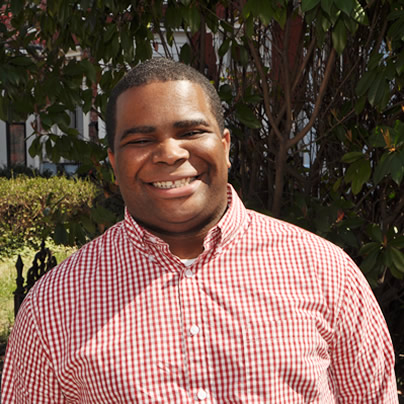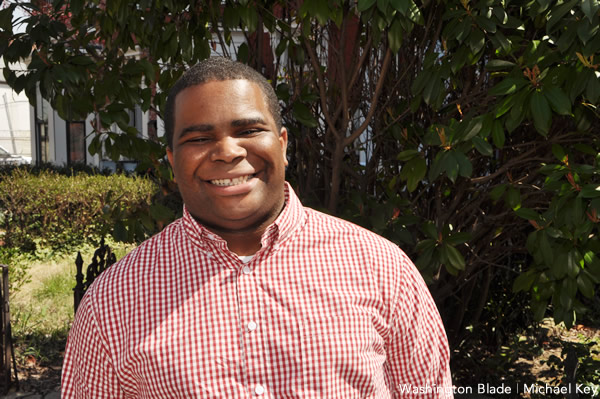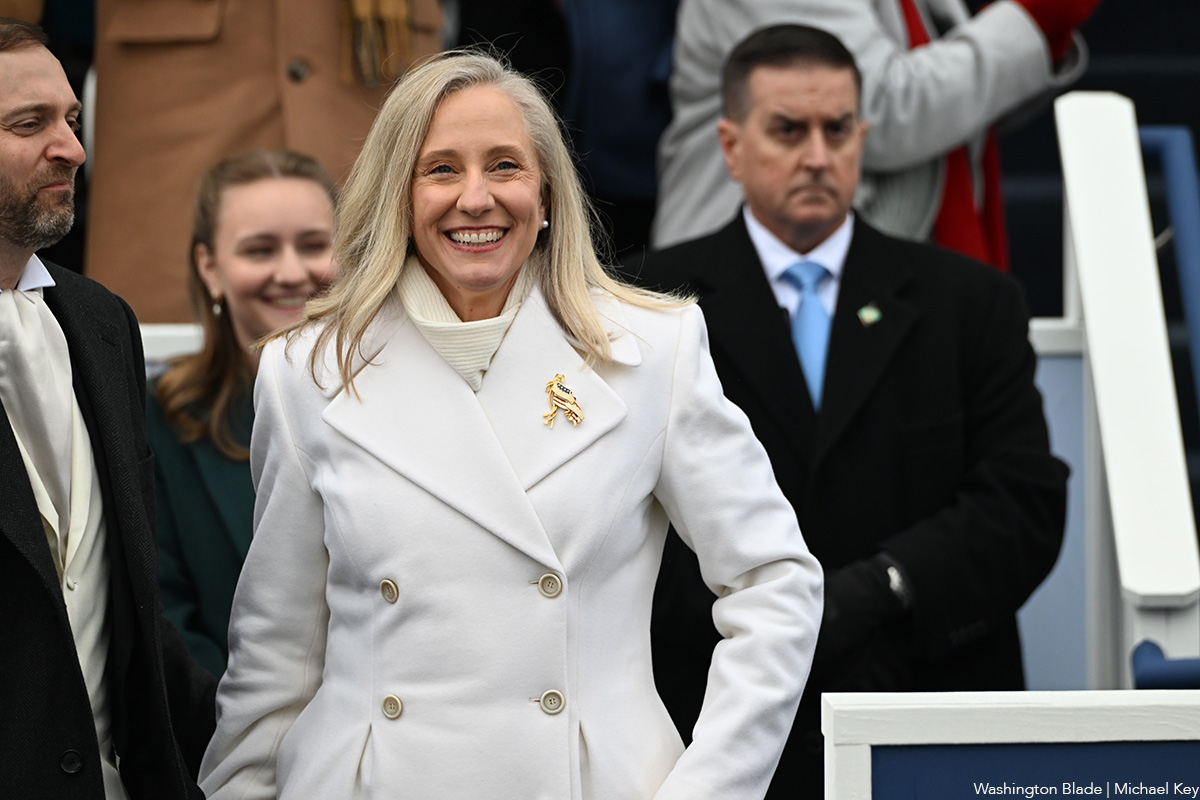Local
Young Democrats of Md. leader comes out
Tells of journey from closeted backer of Prop 8 to gay advocate in P.G. County


Joseph Kitchen, Jr. (Washington Blade photo by Michael Key)
Joseph L. Kitchen Jr., who won election in February as president of the Young Democrats of Maryland, has emerged as an up-and-coming political activist in Prince George’s County, where he lives, and in the state capital in Annapolis.
Kitchen, 26, is an ordained minister in the Southern Baptist Church and an active member of First Baptist Church of Glenarden, Md., one of the largest black churches in the D.C. metropolitan area. He leads a youth worship group at the church.
He works full-time as an assistant principal at a private middle school in D.C.’s Anacostia neighborhood. Although he loves politics and is deeply committed to his Christian faith, he says his main passions are issues related to “education equality, crime and justice and economic justice for people of color.”
Among other involvements, Kitchen serves as assistant treasurer for the NAACP’s Prince George’s County chapter, serves on the Executive Committee of the Maryland Democratic Party, and is a member of the board of First Book D.C., a national group that promotes reading skills for underprivileged children.
During the past month Kitchen says he has been systematically informing his colleagues at the statewide Young Democrats organization and members and leaders of many of the organization’s county chapters that he’s gay.
He says his decision to come out marks the culmination of a path that has taken him from the position of voting for California’s Proposition 8, which banned same-sex marriage in 2008, to an active role last year in campaigning for Maryland’s marriage equality law.
Among other things, Kitchen says he helped direct the Young Democrats’ campaign for the same-sex marriage bill when it came before the Maryland General Assembly and when it came before voters in a referendum campaign last November.
“I believe my faith may have played a role in it,” he says in discussing his vote for Prop 8.
He says he cast that vote by absentee ballot in 2008, two years after he moved to Maryland from his hometown of Fresno, Calif., but retained his California residency and voting privileges.
“And the interesting thing about it is I voted for the proposition knowing who I was,” he told the Blade in an exclusive interview. “But I voted for it. And I think that vote… affirmed to me that I could not live that way anymore.”
Added Kitchen, “I could not be publicly who I was saying I was but knowing my private life. And so when I did that – immediately after I did that – of course my position changed. I started to become more comfortable about who I was.”
He says he also became more comfortable in reconciling his religious beliefs with his sexual orientation.
“I had to believe and come to realize, as a person of faith, that I am made in God’s image and he has made me to be who he wants me to be, that God made me this way because this is who I am and I’m made in his image.”
Kitchen says his decision to come out in the spring of 2013 also was based on practical considerations as well as on inspiration from the openly gay people he worked with on the Maryland marriage campaign and through his activities with the Young Democrats organization.
“I grew up in California in a very religious African-American family,” he says. “I went to college. I went to seminary and became an ordained minister. But I’ve always known that I was gay,” he says.
“I’ve always felt like that was my personal life and I would leave it at that and I would continue to be an African-American young man who is a minister in the Baptist Church — in the Southern Baptist Church.
“But I think what I’ve seen over the last few years — the rise of this movement, which has really been impressive to me. Being in the Democratic Party and meeting so many people — I view them as being very inspirational to me by telling their stories and affirming their truth and being very proud of who they are. That has given me the courage to do this as well.”
Kitchen says that since he and his partner moved into a suburban style, single-family house in Cheverly, the exercise of remaining in the closet would likely become impractical and awkward. He and his partner are seen together as a couple.
“And so the fact that I have those types of things eventually I think people would know,” he says. “And I prefer that people know on my terms as opposed to me responding to it on someone else’s terms.”
Since moving to Cheverly from Fresno, Kitchen has become a mover and shaker in the political establishment of a majority black county whose elected representatives in the Maryland General Assembly are considered important in setting the state’s legislative agenda.
In the relatively short time he’s lived in Prince George’s County, Kitchen says he’s observed what he considers a major change in attitudes in favor of LGBT equality in general and support for same-sex marriage in particular.
He says he watched with interest when the marriage equality bill died in the General Assembly the year before it passed.
“One of the things that made the bill die the first time it was presented in the legislature is our delegates balked at the idea,” he says. “Their people were opposed to it so they became opposed to it.”
Many in Prince George’s County opposed the bill, according to Kitchen, because there was little or no outreach to black churches and black constituencies in the county by the LGBT organizations advocating for the bill.
“And in Prince George’s County we had always been told for so long that we are against gay marriage … And that’s all that people have ever known,” he says.
“I think they learned that lesson the second time around,” he says of marriage equality advocates. “Equality Maryland and Gov. O’Malley and his PAC all learned that and they sent organizers in. They made phone calls. They did door knocking,” according to Kitchen.
“And groups like the Young Democrats of Maryland and Prince George’s County Democrats all got there and they knocked on doors and they went into these communities and they went to the community centers and the churches and they talked to ministers,” he says.
“And I don’t think we can give enough credit to President Barack Obama and what his support immediately gave to lifting that ballot measure,” Kitchen says. “I don’t know if it necessarily changes everybody’s mind. But it gave people the permission they needed to do what I think they always felt was right.”
When asked how he thinks his coming out will impact his relationship with the key people in his political, professional and religious life, Kitchen says nearly everyone so far has been accepting and supportive, although he expects some bumps in the road to come his way.
“My hope is to not have this become my life,” he told the Blade. “My life is about a lot of things. And for 26 years it has not been who I love and who I sleep with that defines my life.
“So I want this to be out there and of course I’m going to have to deal with it for a while,” he says. “But then I want to return to the issues that I’ve made the passion of my life, which are education equality, crime and justice and economic justice for people of color. Those are the issues that are important to me.”
He quickly added that at least one more thing is important to him.
“So I’m still an ordained minister. I don’t plan to give that up. I worked very hard for it. I believe in order to become an ordained minister you have to believe you are called to do such work. And I do believe I was called to do such work.”
Virginia
Va. activists preparing campaign in support of repealing marriage amendment
Referendum about ‘dignity and equal protection under the law’

Virginia voters in November will vote on whether to repeal their state’s constitutional amendment that defines marriage as between a man and a woman.
Democratic Gov. Abigail Spanberger on Feb. 6 signed House Bill 612 into law. It facilitates a referendum for voters to approve the repeal of the 2006 Marshall-Newman Amendment. Although the U.S. Supreme Court’s Obergefell ruling extended marriage rights to same-sex couples across the country in 2014, codifying marriage equality in Virginia’s constitution would protect it in the state in case the decision is overturned.
Maryland voters in 2012 approved Question 6, which upheld the state’s marriage equality law, by a 52-48 percent margin. Same-sex marriage became legal in Maryland on Jan. 1, 2013.
LGBTQ advocacy groups and organizations that oppose marriage equality mounted political campaigns ahead of the referendum.

Equality Virginia has been involved in advancing LGBTQ rights in Virginia since 1989.
Equality Virginia is working under its 501c3 designation in conjunction with Equality Virginia Advocates, which operates under a 501c4 designation, to plan campaigns in support of repealing the Marshall-Newman Amendment.
The two main campaigns on which Equality Virginia will be focused are education and voter mobilization. Reed Williams, the group’s director of digital engagement and narrative, spoke with the Washington Blade about Equality Virginia’s plans ahead of the referendum.
Williams said an organization for a “statewide public education campaign” is currently underway. Williams told the Blade its goal will be “to ensure voters understand what this amendment does and why updating Virginia’s constitution matters for families across the commonwealth.”
The organization is also working on a “robust media and voter mobilization campaign to identify and turn out voters” to repeal Marshall-Newman Amendment. Equality Virginia plans to work with the community members to guarantee voters are getting clear and accurate information regarding the meaning of this vote and its effect on the Virginia LGBTQ community.
“We believe Virginia voters are ready to bring our constitution in line with both the law and the values of fairness and freedom that define our commonwealth,” said Equality Virginia Executive Director Narissa Rahaman. “This referendum is about ensuring loving, committed couples and their families are treated with dignity and equal protection under the law.”
The Human Rights Campaign has also worked closely with Equality Virginia.
“It’s time to get rid of outdated, unconstitutional language and ensure that same sex couples are protected in Virginia,” HRC President Kelley Robinson told the Blade in a statement.
District of Columbia
D.C. police arrest man for burglary at gay bar Spark Social House
Suspect ID’d from images captured by Spark Social House security cameras

D.C. police on Feb. 18 arrested a 63-year-old man “of no fixed address” for allegedly stealing cash from the registers at the gay bar Spark Social House after unlawfully entering the bar at 2009 14th St., N.W., around 12:04 a.m. after it had closed for business, according to a police incident report.
“Later that day officers canvassing for the suspect located him nearby,” a separate police statement says. “63-year-old Tony Jones of no fixed address was arrested and charged with Burglary II,” the statement says.
The police incident report states that the bar’s owner, Nick Tsusaki, told police investigators that the bar’s security cameras captured the image of a man who has frequently visited the bar and was believed to be homeless.
“Once inside, the defendant was observed via the establishment’s security cameras opening the cash register, removing U.S. currency, and placing the currency into the left front pocket of his jacket,” the report says.
Tsusaki told the Washington Blade that he and Spark’s employees have allowed Jones to enter the bar many times since it opened last year to use the bathroom in a gesture of compassion knowing he was homeless. Tsusaki said he is not aware of Jones ever having purchased anything during his visits.
According to Tsusaki, Spark closed for business at around 10:30 p.m. on the night of the incident at which time an employee did not properly lock the front entrance door. He said no employees or customers were present when the security cameras show Jones entering Spark through the front door around 12:04 a.m.
Tsusaki said the security camera images show Jones had been inside Spark for about three hours on the night of the burglary and show him taking cash out of two cash registers. He took a total of $300, Tsusaki said.
When Tsusaki and Spark employees arrived at the bar later in the day and discovered the cash was missing from the registers they immediately called police, Tsusaki told the Blade. Knowing that Jones often hung out along the 2000 block of 14th Street where Spark is located, Tsusaki said he went outside to look for him and saw him across the street and pointed Jones out to police, who then placed him under arrest.
A police arrest affidavit filed in court states that at the time they arrested him police found the stolen cash inside the pocket of the jacket Jones was wearing. It says after taking him into police custody officers found a powdered substance in a Ziploc bag also in Jones’s possession that tested positive for cocaine, resulting in him being charged with cocaine possession in addition to the burglary charge.
D.C. Superior Court records show a judge ordered Jones held in preventive detention at a Feb. 19 presentment hearing. The judge then scheduled a preliminary hearing for the case on Feb. 20, the outcome of which couldn’t immediately be obtained.
District of Columbia
Judge rescinds order against activist in Capital Pride lawsuit
Darren Pasha accused of stalking organization staff, board members, volunteers

A D.C. Superior Court judge on Feb.18 agreed to rescind his earlier ruling declaring local gay activist Darren Pasha in default for failing to attend a virtual court hearing regarding an anti-stalking lawsuit brought against him by the Capital Pride Alliance, the group that organizes D.C.’s annual Pride events.
The Capital Pride lawsuit, initially filed on Oct. 27, 2025, accuses Pasha of engaging in a year-long “course of conduct” of “harassment, intimidation, threats, manipulation, and coercive behavior” targeting Capital Pride staff, board members, and volunteers.
In his own court filings without retaining an attorney, Pasha has strongly denied the stalking related allegations against him, saying “no credible or admissible evidence has been provided” to show he engaged in any wrongdoing.
Judge Robert D. Okum nevertheless on Feb. 6 approved a temporary stay-away order requiring Pasha to stay at least 100 feet away from Capital Pride’s staff, volunteers, and board members until the time of a follow-up court hearing scheduled for April 17. He reduced the stay-away distance from 200 yards as requested by Capital Pride.
In his two-page order issued on Feb. 18, Okun stated that Pasha explained that he was involved in a scooter accident in which he was injured and his phone was damaged, preventing him from joining the Feb. 6 court hearing.
“Therefore, the court finds there is a good cause for vacating the default,” Okun states in his order.
At the time he initially approved the default order at the Feb. 6 hearing that Pasha didn’t attend, Okun scheduled an April 17 ex parte proof hearing in which Capital Pride could have requested a ruling in its favor seeking a permanent anti-stalking order against Pasha.
In his Feb. 18 ruling rescinding the default order Okun changed the April 17 ex parte proof hearing to an initial scheduling conference hearing in which a decision on the outcome of the case is not likely to happen.
In addition, he agreed to consider Pasha’s call for a jury trial and gave Capital Pride 14 days to contest that request. The Capital Pride lawsuit initially called for a non-jury trial by judge.
One request by Pasha that Okum denied was a call for him to order Capital Pride to stop its staff or volunteers from posting information about the lawsuit on social media. Pasha has said the D.C.-based online blog called DC Homos, which Pasha claims is operated by someone associated with Capital Pride, has been posting articles portraying him in a negative light and subjecting him to highly negative publicity.
“The defendant has not set forth a sufficient basis for the court to restrict the plaintiff’s social media postings, and the court therefore will deny the defendant’s request in his social media praecipe,” Okun states in his order.
A praecipe is a formal written document requesting action by a court.
Pasha called the order a positive development in his favor. He said he plans to file another motion with more information about what he calls the unfair and defamatory reports about him related to the lawsuit by DC Homos, with a call for the judge to reverse his decision not to order Capital Pride to stop social media postings about the lawsuit.
Pasha points to a video interview on the LGBTQ Team Rayceen broadcast, a link to which he sent to the Washington Blade, in which DC Homos operator Jose Romero acknowledged his association with Capital Pride Alliance.
Capital Pride Executive Director Ryan Bos didn’t immediately respond to a message from the Blade asking whether Romero was a volunteer or employee with Capital Pride.
Pasha also said he believes the latest order has the effect of rescinding the temporary stay away order against him approved by Okun in his earlier ruling, even though Okun makes no mention of the stay away order in his latest ruling. Capital Pride attorney Nick Harrison told the Blade the stay away order “remains in full force and effect.”
Harrison said Capital Pride has no further comment on the lawsuit.



















